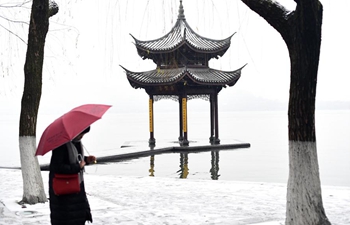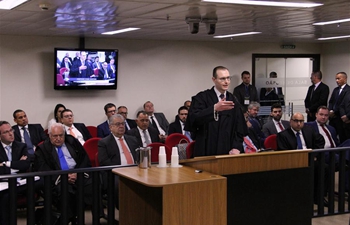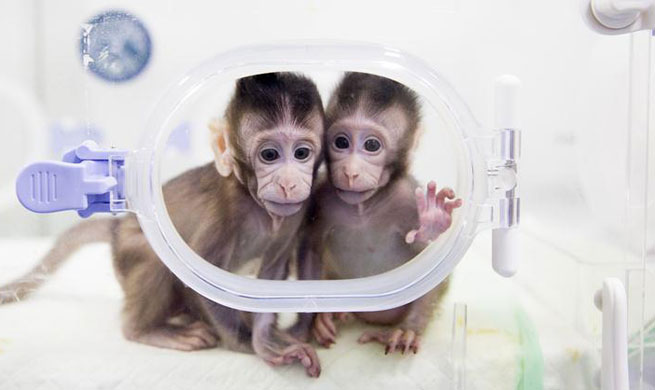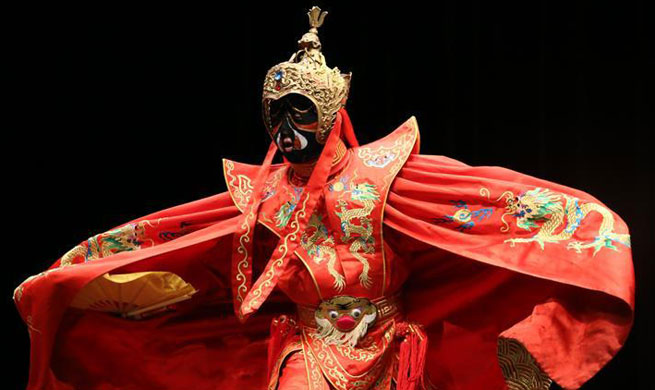WASHINGTON, Jan. 25 (Xinhua) -- U.S. President Donald Trump's decision to slap steep tariffs on imports of washers and solar cells would cost more American jobs than he wants to save, analysts said.
Trump has approved imposing safeguard tariffs of up to 50 percent on imported washers for the next three years and of up to 30 percent on solar cells and modules for the next four years, the Office of the United States Trade Representative said in a statement on Monday.
The move marked the first time since 2001 that the U.S. government has used Section 201, an outdated tool under the rarely used Trade Act of 1974, to unilaterally impose tariffs or other trade restrictions on foreign imports.
It has spurred opposition from U.S. industries, Republican lawmakers, free-trade advocates, Asian manufacturers and government officials.
"This is a mistake," Mark Sanford, a Republican Congressman from the state of South Carolina, where South Korea-based Samsung Group is building a new manufacturing plant for washers, said in a statement Tuesday.
Increased tariffs sound great but set countries on a financial road to ruin, Sanford said. "This is shortsighted and will cost American jobs," he predicted.
Samsung, which faces trade rivalry from U.S. washer maker Whirlpool, called Trump's decision "a great loss for American consumers and workers."
"This tariff is a tax on every consumer who wants to buy a washing machine. Everyone will pay more, with fewer choices," the company said in a statement.
The Solar Energy Industries Association (SEIA), the national trade association for the industry, estimated Trump's new tariffs on solar imports would lead to the loss of roughly 23,000 American jobs this year and the delay or cancellation of billions of dollars in solar investments.
Tariffs in this case "will create a crisis in a part of our economy that has been thriving, which will ultimately cost tens of thousands of hard-working, blue-collar Americans their jobs," said Abigail Ross Hopper, SEIA's president and chief executive.
Analysts said the new tariffs will not only raise prices for American consumers but also hurt the workers Trump has vowed to protect. History has shown that hefty safeguard tariffs by previous U.S. administrations destroyed far more American jobs than they saved.
The Obama administration's decision to levy safeguard tariffs on Chinese tires in 2009 temporarily helped save 1,200 jobs in the U.S. tire industry, but at a cost of 900,000 U.S. dollars per job due to higher prices, according to a study by the Peterson Institute for International Economics.
"The additional money that U.S. consumers spent on tires reduced their spending on other retail goods, indirectly lowering employment in the retail industry," the study said, showing a loss of around 3,731 jobs in the U.S. retail sector due to safeguard tariffs.
The George W. Bush administration's safeguard tariffs on steel imports in 2002 also caused about 200,000 job losses, one-fourth of them in metal-making, machinery and transportation equipment and parts sectors, according to Clark Packard, trade policy counsel at R Street Institute, an American think tank.
The Bush administration withdrew the steel tariffs after they were successfully challenged at the World Trade Organization (WTO) by a number of countries, Packard said. He noted that Trump's solar tariffs could face a similar challenge at the WTO and the United States is likely to lose the case.
South Korean Trade Minister Kim Hyun-Chong said Tuesday at a meeting with local corporate leaders that he would file a petition against Trump's safeguard measures at the WTO.
Chinese officials also urged the United States to refrain from abusing trade remedies, and said China will work with other WTO members to defend their interests.
"We're certainly against any unilateral protectionist measures, and we've the right to take measures to protect legitimate interests," Cui Tiankai, Chinese ambassador to the United States, told USA Today's editorial board on Tuesday.
The ambassador reiterated that China is firmly against any trade war, as a trade war would hurt both China and the United States and not help anybody.

















